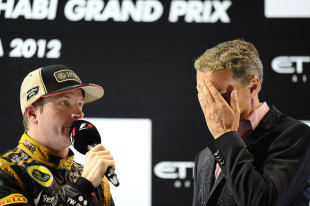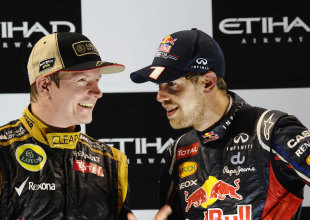
- Drivers:
- Kimi Räikkönen
- |
- Sebastian Vettel
As tumultuous as the Abu Dhabi Grand Prix proved to be, I felt that it lost a good deal of its lustre on the podium. The use of the 'F' and 'S' words on live, global TV is totally unacceptable and should be jumped-upon immediately by the FIA. $50,000 fines would be about right.
Yes, I understand that Finnish and German are the first languages of Messrs Raikkonen and Vettel. All the more reason for this whole issue to be given the importance it deserves. In the absence of any sort of unified, co-ordinated F1 marketing and public relations department, it behoves the teams to instruct their drivers clearly on matters of manners, protocol and local custom.
You or I may not worry too much about drivers swearing after the race; but in some parts of the world - notably the USA, spraying four-letter words even on network TV, let alone on a live, global world feed - it is tantamount to drinking champagne on the podium in a Muslim country. And, in case it had escaped everyone's notice, the next round of the F1 Championship happens to be in the USA. That being the case, I suggest that all relevant team personnel take a crash course on what is acceptable, and what isn't, on prime-time American TV. Believe me. America is ultra-conservative by F1 standards - Conservative with a capital C.
Of course, at a different level, the swearing in Abu Dhabi unearths a deeper problem - i.e., F1's ability to laugh away all its traumas and carry on as if the world doesn't have an economic credit crunch and that TV viewing figures are continuing to climb. And, so long as the luxurious motorhomes continue to shelter the dark-windowed meetings, and the private aircraft and the first-class cabins insulate the power-brokers from the vicissitudes of international travel, it's easy to understand why everyone, come Thursday afternoon at any given F1 race, always feels so jolly.
From where I sit, however, The Financial Times and the Wall Street Journal do not make great reading. There is an ongoing global economic crisis out there - and most of it is being driven by F1-based Europe. And TV figures are down about six per cent in 2012, despite the left-field new winners and the drama of Ferrari's up-and-down championship.
F1 still offers a great show; don't get me wrong. The point is that F1 needs to provide increasingly more return for its sponsorship dollar. The sport needs to be more creative with its TV output; the teams need to provide much more than just advertising space. All this is happening - but it is not happening in a coordinated way.

You're the CEO of a US Fortune 500 company; you've just enjoyed the race at Yas Marina; you, your wife and your young son are all watching the podium ceremony…and then the double World Champion glibly throws out the F-word. Will the winner of the major golf tournament that the CEO recently attended have done the same thing? I think not. Will that CEO then feel less secure about spending his company's money in F1? Probably.
I say all this in the context of other sports - and in the context of the global TV feed. It's one thing to use 'acceptable' swear words on national TV; it's quite another to use them globally, as if all cultures will react similarly.
The global TV phenomenon, as it happens, is one of F1's key ingredients. In golf, tennis, soccer, cricket, rugby, NASCAR and most other major sports you can name, the TV feed is generally produced by the main TV network of the venue country. F1 is different. It produces its own world feed at every race (bar Monaco, I think). This ensures great consistency from one race to another but by implication it also requires the teams to perform to a 'code of conduct' that is acceptable to all cultures and locations.
Why am I being so precious? Because, ultimately, F1 lives and dies with its TV show. Without TV there would be no big money in the sport; without big money there would be no circuits lining up to stage races - or teams out there, spending millions on racing and research and development. Compromise the TV show and you compromise the lifeblood of the sport.
There are plenty of ways to improve F1's TV show - and most of them involve very little additional cost. One is for the teams constantly to remind themselves that they are a part of what is still the world's biggest TV sport and that, as such, they are a part of a show that lasts 365 days of the year, not just the race weekends. Drivers should be out there, promoting the show - the sport - about as much as they're out there promoting the team sponsors - especially in key markets like the USA, China, Korea and India.
A second way is to bring more people into the action. They don't cost as much as racing cars to run and sometimes they are at least as interesting. Let's penetrate those dark-windowed rooms with the TV cameras; between races, let's make each F1 team a living, breathing mini TV show in its own right.
Reality TV has soared in popularity over the past 10 years. I'm not a fan of Big Brother, I have to confess, but nor do I hide from the facts. And we need more of what I would call 'reality TV' in F1. There's plenty of content out there: it's just a question of the teams working to a logical plan of action.
And a third is never to hurt the world feed - as swearing hurt it in Abu Dhabi. Building something up is much more difficult than tearing it down - and thus we should be careful, very careful, about what we put out there for public consumption and how we present it.

